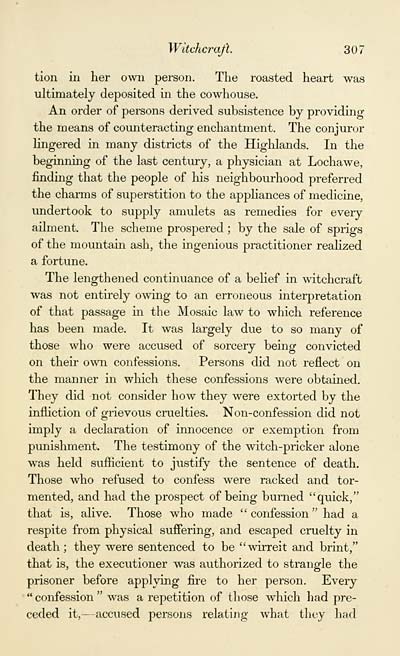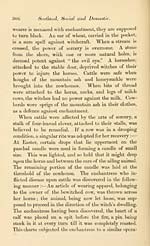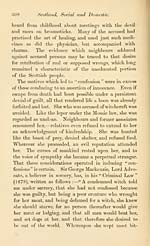Grampian Club > Scotland, social and domestic
(313) Page 307
Download files
Complete book:
Individual page:
Thumbnail gallery: Grid view | List view

Witchcraft. 307
tion in her own person. The roasted heart was
ultimately deposited in the cowhouse.
An order of persons derived subsistence by providing
the means of counteracting enchantment. The conjuror
lingered in many districts of the Highlands. In the
beginning of the last century, a physician at Lochawe,
finding that the people of his neighbourhood preferred
the charms of superstition to the appliances of medicine,
undertook to supply amulets as remedies for every
ailment. The scheme prospered ; by the sale of sprigs
of the mountain ash, the ingenious practitioner realized
a fortune.
The lengthened continuance of a belief in witchcraft
was not entirely owing to an erroneous interpretation
of that passage hi the Mosaic law to which reference
has been made. It was largely due to so many of
those who were accused of sorcery being convicted
on their own confessions. Persons did not reflect on
the manner in which these confessions were obtained.
They did not consider how they were extorted by the
infliction of grievous cruelties. Non-confession did not
imply a declaration of innocence or exemption from
punishment. The testimony of the witch-pricker alone
was held sufficient to justify the sentence of death.
Those who refused to confess were racked and tor-
mented, and had the prospect of being burned "quick,"
that is, alive. Those who made "confession" had a
respite from physical suffering, and escaped cruelty in
death; they were sentenced to be "wirreit and brint,"
that is, the executioner was authorized to strangle the
prisoner before applying fire to her person. Every
" confession " was a repetition of those which had pre-
ceded it, — accused persons relating what they had
tion in her own person. The roasted heart was
ultimately deposited in the cowhouse.
An order of persons derived subsistence by providing
the means of counteracting enchantment. The conjuror
lingered in many districts of the Highlands. In the
beginning of the last century, a physician at Lochawe,
finding that the people of his neighbourhood preferred
the charms of superstition to the appliances of medicine,
undertook to supply amulets as remedies for every
ailment. The scheme prospered ; by the sale of sprigs
of the mountain ash, the ingenious practitioner realized
a fortune.
The lengthened continuance of a belief in witchcraft
was not entirely owing to an erroneous interpretation
of that passage hi the Mosaic law to which reference
has been made. It was largely due to so many of
those who were accused of sorcery being convicted
on their own confessions. Persons did not reflect on
the manner in which these confessions were obtained.
They did not consider how they were extorted by the
infliction of grievous cruelties. Non-confession did not
imply a declaration of innocence or exemption from
punishment. The testimony of the witch-pricker alone
was held sufficient to justify the sentence of death.
Those who refused to confess were racked and tor-
mented, and had the prospect of being burned "quick,"
that is, alive. Those who made "confession" had a
respite from physical suffering, and escaped cruelty in
death; they were sentenced to be "wirreit and brint,"
that is, the executioner was authorized to strangle the
prisoner before applying fire to her person. Every
" confession " was a repetition of those which had pre-
ceded it, — accused persons relating what they had
Set display mode to: Large image | Transcription
Images and transcriptions on this page, including medium image downloads, may be used under the Creative Commons Attribution 4.0 International Licence unless otherwise stated. ![]()
| Publications by Scottish clubs > Grampian Club > Scotland, social and domestic > (313) Page 307 |
|---|
| Permanent URL | https://digital.nls.uk/81900440 |
|---|
| Description | Note: Numbers 24-41 are relative to but not part of the Club's series. |
|---|---|

